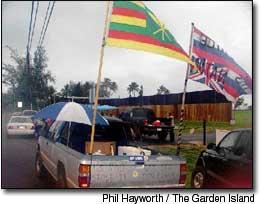To protect the remains of ancestors, a half-dozen Native Hawaiian activists Wednesday blocked access to the Waipouli Beach Resort construction site across from the Kauai Village shopping center. As the work for the 12.6-acre resort begins, the activists say both
To protect the remains of ancestors, a half-dozen Native Hawaiian activists Wednesday blocked access to the Waipouli Beach Resort construction site across from the Kauai Village shopping center.
As the work for the 12.6-acre resort begins, the activists say both workers and the state have not taken care of the ‘Iwi, or the remains of their ancestors buried at the site.
Police moved in to remove the protesters in the early afternoon, but, because work was already shut down for the day, the group had already left.
Some did say they’d be back this morning.
Chris Singleton, one of the developers, said the group had trespassed and that the group could be charged with criminal trespass.
The day-long shut down resulted in an estimated loss of $10,000 to the developers, according to the developer’s contractor, Unlimited Construction.
Developers say they have gone out of their way to protect the culture and respect the ways of the Hawaiians. Plus, they added, the permits have already been acquired and construction will go on.
Sonny Waialeale, one of the protesters, came armed with a cease and desist motion.
“You are to cease and desist from any further trespass or construction on this ancient sacred burial grounds of our ancestors,” it said.
“We demand that the Department of Land and Natural Resources, by the authorization of the Interior Department of the U.S., cease and desist from allowing these federal citizens illegal right of entry over the low-water mark, possessed by the people’s government of the loi or the taro patch of Helu 4821,” the order continued.
“Who gives them the right to (move) our ancestral bones?” Waialeale, the former owner of a Wailua River Boat Tour company, said. “It’s the state and county’s problem to prove why they can” re-bury them.
“It’s nothing against the owner,” he said. “It’s the State and County, the people who gave them the right to build this. (We) Kanakas never gave them the right.”
“It used to be an old fishing village,” complete with a fishpond and a place to store and work on canoes, said James Alalem, who grew up within a hundred yards of the site. “We used to find skulls all the time when we were playing.”
Alalem, who found what appeared to be a spinal bone early yesterday morning, said that he has been watching the construction and seen workers desecrate bones and important cultural sights, such as the fishpond.
“This place still has big-time bones,” Alalem said. “At night, I pray to the Kappas. I blow my pu and honor them, their sorrow.”
But La France Kapaka-Arboleda, Chair of the state Burial Council of Kaua‘i and Ni‘ihau, disagreed with Alalem and called his claims of Native Hawaiian heritage into question. She said she went to the site yesterday, and questioned his background. He refused to answer.
She also said that at least one protester was not just there to protect the ‘Iwi.
“You have to have a singleness of mind,” said Kapaka-Arboleda. “You can’t use ‘Iwi as a springboard, as a platform on issues of development.” “This is not something I take lightly,” said Kapaka-Arboleda. “Had they verbalized their concerns, I could have talked to them about the process to go through.” “Burial meetings are open to the public and they can be put on an agenda and be heard,” she said. “I can respect their right, but I work with the facts,” she added. “They should’ve spoken up (earlier) and been part of the process.”


